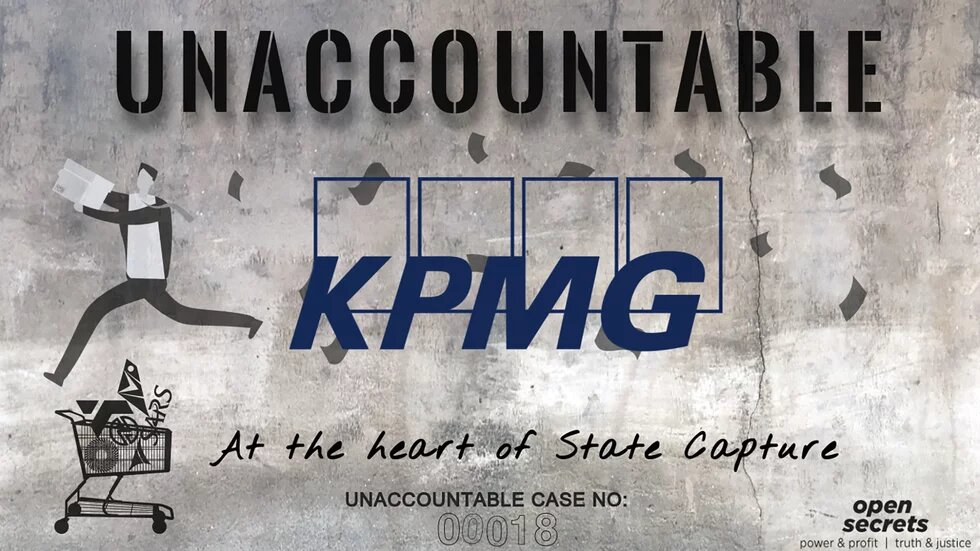The Big Four auditing firms - Deloitte, EY, KPMG and PwC - played a systemic role in economic crimes and State Capture. The evidence suggests that these firms have prioritised profit over professional duties and the law. Accountability and reform of the industry is thus essential.

In July, Open Secrets released the latest Corporations and Economic Crime Report (CECR). Volume 2 – The Auditors – draws on information from Open Secrets’ investigations and publicly available information to illustrate the crisis faced by the auditing industry and how this affects the public.
The previous instalments have focused on Deloitte and EY. This piece turns to KPMG, the auditing firm at the centre of many State Capture scandals.
The costs of contemporary State Capture in South Africa have been disastrous. Taking into account the money lost directly to corruption, low or non-existent economic growth, lost jobs, and an explosion of public debt and borrowing costs, estimates range from the conservative R500-billion to R1.5-trillion. The austerity measures enforced to appease credit ratings agencies have hit vulnerable South Africans the hardest. This was the case even before the devastation wrought by the Covid-19 pandemic, which has also disproportionately harmed the poor.
But when it comes to State Capture, not even the upper-bound estimates can fully cover the consequences of the destruction of institutional independence and capacity throughout the state, including crucial institutions like the South African Revenue Service (SARS).
As we have submitted to the Zondo Commission, banks, law firms, consultancies and the Big Four auditing firms were key enablers of the State Capture project, and are also responsible for the associated harms of State Capture. This is nowhere more clear than in the case of KPMG.
After apologising for its role in enabling some of the most egregious State Capture corruption, KPMG committed to appearing before the Zondo Commission in early 2019. This has still not happened, and KPMG’s leadership has still not had to answer the difficult questions of clarifying its role in State Capture.
A rogue investigation
KPMG’s role in State Capture first garnered public attention in relation to the infamous KPMG “rogue unit” report it completed in 2015 at the behest of then SARS Commissioner Tom Moyane.
In 2007, a special investigative and enforcement unit was created within SARS by a joint agreement between SARS and the National Intelligence Agency (now the State Security Agency). SARS obtained three legal opinions at the time on the legality of the unit – all gave the green light to proceed. Two months after his appointment as SARS commissioner by Jacob Zuma in September 2014, Moyane enlisted KPMG to conduct a forensic investigation into allegations of a covert unit at SARS that was allegedly spying on Zuma and Julius Malema, the leader of the EFF.
Given the importance of the issue in the public interest and in safeguarding the integrity of SARS, South Africans expected that a leading forensic firm would undertake a thorough and careful investigation. This was not the case.
The KPMG report found that the unit was breaking the law and was thus “rogue in nature”. However, the report had striking similarities to earlier investigations by advocate Muzi Sikhakhane and the law firm Mashiane Moodley & Monama (MMM), which had been commissioned by former acting head of SARS Ivan Pillay. A later examination revealed that KPMG had plagiarised sections of the MMM report, including grammatical and spelling errors – it was literally a copy-and-paste exercise.
Roy Waligora, head of KPMG forensics, led an internal investigation into the report. Waligora found that the lead auditor on the KPMG report had been “unprofessional and lazy”, leading to an inaccurate report. Advocate Dumisa Ntsebeza, who chaired the South African Institute of Chartered Accountants (Saica) inquiry into the saga, went further and concluded that the KPMG auditor’s conduct had been “an act of absolute dishonesty”. KPMG later admitted that there had been no internal partner review of the investigation, calling this “substandard” quality control. Ntsebeza’s report found there was a prima facie case that KPMG staff had violated Saica’s professional code of ethics.
KPMG’s report, alongside those of Sikhakhane and MMM, was used to justify the dismissal of about 50 senior officials at SARS, and investigations into Pillay, Pravin Gordhan and Johan van Loggerenberg. This, coupled with a coordinated restructuring of SARS by Moyane and management consultant Bain & Co, had an undoubtedly negative effect on SARS’s capacity to generate revenue. In the first quarter of 2017 alone, the agency failed to meet its revenue target by R13-billion, and rebuilding the institution continues today. KPMG would eventually retract the report and apologise to those affected. In 2020, all criminal charges were withdrawn by the National Prosecuting Authority.
This was not the last time KPMG would be linked to State Capture. It also played a critical role in one of the most audacious and iniquitous State Capture stories to date.
***********************